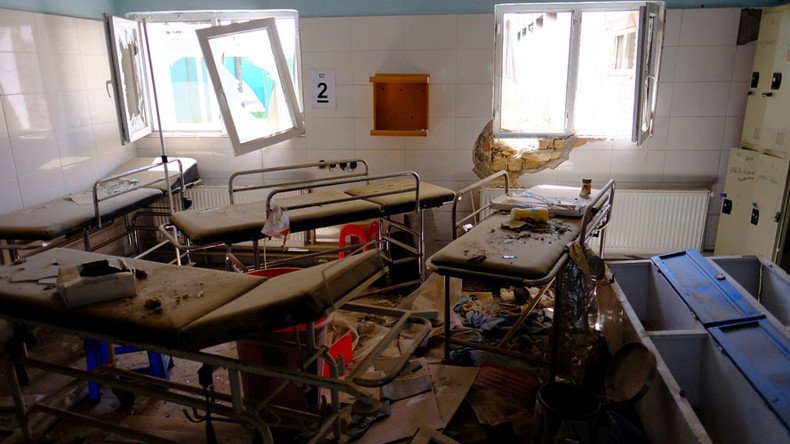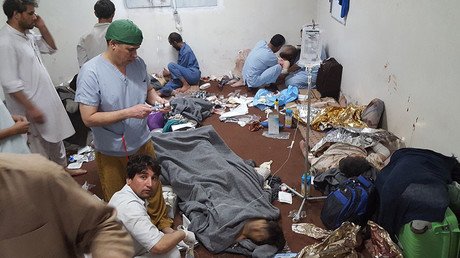Human errors & technology failures led to MSF hospital strike in Kunduz - CENTCOM

Sixteen people will be punished for their involvement in the October airstrike on a Doctors Without Borders hospital in Kunduz, Afghanistan that resulted from human errors and technology failures, according to US Central Command official.
On Friday morning, Army General Joseph L. Votel, commander of US Central Command (CENTCOM) presented the results of the military investigation into the bombing of a Médecins Sans Frontières (MSF/Doctors Without Borders) facility that claimed lives of 42.
“The investigation ultimately concluded that this tragic incident was caused by a combination of human errors, compounded by process and equipment failures,” Votel said.
The probe found that the operation was launched 69 minutes earlier than planned and the crew did not get all of the preparatory information because of the moved-up timeline, including the “identification of no-strike areas.” In addition, he said that the satellite radio signal failed.
When they arrived at the location called in by the US Special Forces that were partnered with an Afghan special operation ground force, they received fire from a surface-to-air missile. The crew then flew several miles away from the city center, where they received the grid coordinates of a Taliban-controlled building. However, they were directed to an empty field, “which was obviously not the correct location,” Votel said. The aircrew then attempted to find their intended target in the nearby area. “Instead, they found the Doctors Without Borders Trauma Center that generally matched the physical description of the building relayed over the radio by the ground force."
Votel said the crew mistakenly believed that they were firing on intended target, a Taliban compound located 400 meters away, not the protected trauma center.
“I want to emphasize that the trauma center was a protected facility and was on a no-strike list. Our forces did not receive fire from the trauma center during the incident, nor did the investigation find that insurgents were using it as a base for operations,” he said.
He also noted that people on the ground experienced "fatigued from [five] days of fighting, still engaged with an aggressive enemy and running low on supplies,” which also contributed to the mistake.
Army General John Campbell, then the US Forces-Afghanistan commander, directed the investigation, and took action against 12 of the personnel still in Afghanistan, including the general officer. The actions included suspension and removal from command, letters of reprimand, formal counseling and extensive retraining. Five personnel had already returned to the US, so Campbell forwarded on the investigation to Votel, who took action against four of the five service members by issuing “letters of reprimand and admonishment” and referring the flight crew to a USAF flight evaluation board “to assess their suitability for future flight duties.”
14 killed in hospital strike in Aleppo while UN's de Mistura urges to protect ceasefire https://t.co/93CghVueJcpic.twitter.com/y6rb9rvliN
— RT (@RT_com) April 28, 2016
Votel referred the fifth service member to the commander of the US Army special operations command, who issued “a written reprimand and directed recertification in the service member’s job specialty.”
“From a senior commander’s perspective, the measures taken against these individuals were appropriate to address the errors that they made,” he said, noting that these “adverse administrative actions” can carry severe repercussions on the careers and professional qualifications of these individuals that could include denial of promotion or advancement, and possible separation from the service.
Votel did not disclose the identities of those punished “to protect the privacy of the individuals and because some of them remain assigned to overseas, sensitive or routinely deployable units.”
The investigation found that, while the 16 service members failed to comply with the rules of engagement and the law of armed conflict, none of the failures are considered to be war crimes because the facility was not intentionally targeted.
“The label ‘war crimes is typically reserved for intentional acts ‒ intentionally targeting civilians or intentionally targeting protected objects or locations,” Votel said.
An earlier report from MSF said that the trauma center was “fully functioning” at the time of the airstrikes, with 105 patients admitted and surgeries taking place, according to the findings of its investigation.
“Patients burned in their beds, medical staff were decapitated and lost limbs, and others were shot by the circling AC-130 gunship while fleeing the burning building. At least 30 MSF staff and patients were killed,” it states.
Defense Secretary Ash Carter is expected to issue guidance later on Friday designed to avoid similar problems in the future.
Votel kept reminding reporters throughout the press conference that the airstrike took place during "an intense combat situation."













